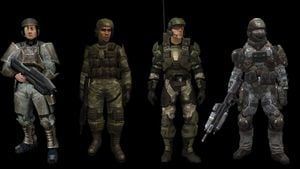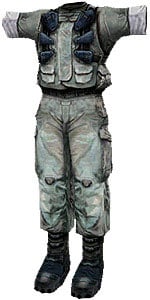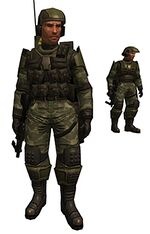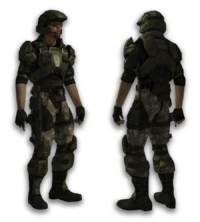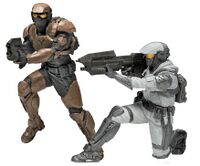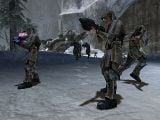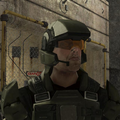UNSC Marine Corps Battle Dress Uniform
From Halopedia, the Halo wiki
The UNSC Marine Corps Battle Dress Uniform or BDU is the standard-issue combat uniform worn by the members of the UNSC Marine Corps. Inferior to more sophisticated armor suits such as the Battle Armor worn by the ODSTs or the MJOLNIR Armor worn by the SPARTANs, the armor relies on more traditional methods of protection.
Introduction
As opposed to the Dress Uniform worn at parades and functions, the BDU is intended for use in combat situations. As a large fighting force, the UNSC Marines use a great variety of different BDUs. Standard Marine Battle Dress Uniform consists of armor plating over camouflaged combat utilities, and includes a number of ammunition pockets, holsters, and other features.
Unlike the radically more advanced MJOLNIR Armor worn by the Spartan-II soldiers, the Marine BDU does not include a dynamic recharging energy shield, providing far inferior protection against directed-energy and projectile weapons.
Components
The components of the Marine BDU vary, depending on the version.
Fatigues
- Main article: Fatigues (Uniform)
Camouflaged combat utilities are worn under the armor. The UNSC is known to use a variety of camouflage patterns depending on the environments, including all-grey fatigues, woodland camouflage, urban camouflage or winter camouflage.
Combat boots
Combat boots such as the VZG7 Armored Boots are worn with the uniform, usually equipped with different types of additional armor to provide greater protection to the lower leg.
Armor
The Marine BDU is equipped with ballistic armor in multiple points, such as the torso, shoulders, and the lower legs. Some versions incorporate armor in the forearms and thighs as well.
The armor is extremely resilient towards traditional ballistic weaponry. However, it is easily damaged by plasma weaponry. The armor consists of several layers, some of which include a ballistic recoil-absorbing gel layer and a heat reduction gel layer to help reduce velocity and felt shock from ballistics, shrapnel, and explosives as well as reducing the burn caused by plasma once it reaches flesh.
This heat reduction layer also reduces the chance of the plasma penetrating by counter-acting and dissipating the heat, effectively disarming the blast. While this armor protects the wearer from harm caused by weaponry it also has temperature-regulation units integrated into it to keep the wearer at optimum supportability while eliminating the need to change depending on the environment. This also reduces the enemy's ability to track soldiers via thermal energy as it is mostly hidden beneath this armor.
During late 2552, the M52B Body Armor was standard-issue. Lighter body armor, such as Ballistic Assault Vests are also used in some operations.
Headgear
Marine helmets are mounted with high-tech equipment, such as holographic text-displaying eyepieces, helmet recorders and microphones. Tactical goggles are also used by some Marines. The CH252 Helmet and its variants are standard issue during most of 2552, and what appears to be its early version was worn already in 2531. As well as helmets, Marines on field operations in more humid locales sometimes choose to wear boonie covers, or those in colder environments don visored and thicker helmets. Marines have a Heads Up Display not just from their helmets, but from their standard Neural interface which projects HUD data directly to the Marine's retina. In hazardous situations, Gas Masks such as the S90 Gas Mask are worn.
Marine NCOs are easily recognized by the cover that they wear complete with the UNSCDF insignia, although they often times substitute this soft cover for a more practical protective helmet.
Marine Pilot Armor
Marine Pilots usually wear a modified version of the standard marine uniform, though they are known to utilize the BDU without modifications as well. The helmet is often different from the standard Marine helmet.
Pilots stationed aboard the UNSC Pillar of Autumn wore standard gray fatigues, with a brown leather vest, and helmets with a visor that fully covered the eyes. During the Battle of Mombasa, Pelican dropship pilots wore full standard Marine BDU, wearing pilot helmets with large, gold-colored visors.
Pilots during the late Battle of Earth and the Battle of Installation 00 wore more advanced equipment, fully-sealed helmets and an additional control panel on the standard chest armor piece. Each helmet bears a wing symbol, likely denoting the pilots' particular specialty.
Versions
There seem to be a number of varieties to the Marine BDU. It is unknown if the changes between the games are instances of different armor models altogether, or if the changes are simply aesthetic.
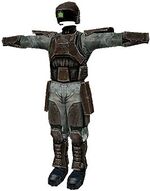
Halo: Combat Evolved
The equipment used during the Battle of Installation 04 involved gray fatigues and a soft armor vest, and over that, pieces of brown armor plating covering the head, torso, shoulders, thighs and shins. Overall, this armor seems to be the heaviest incarnation of the Marine armor.
At times, the Marines only wore their utilities and soft body armor, even forgoing helmets and body armor plating in hazardous combat operations. At times, their helmets were also substituted for boonie covers and sometimes bandanas. Some Marines had small medical packs built into their back armor plating. The helmets also included a small, green tactical eyepiece, a feature not seen in any other versions.[1]
Halo 2
The design of the Marine BDU was completely overhauled for Halo 2. The uniform involved olive green armor pieces, with a woodland camouflage-covered battledress.
It had less armor pieces than the variant seen in the first game, namely lacking armor on the thighs, but also came with more ammunition storage pockets. The tactical vest had two pieces of armor, with numerous storage pouches often attached to it. Some Marines also wore holsters on their other thigh. The armor had black knee and elbow pads, although apparently only lightly armored. The uniform also included armored shoulder pads, also lighter than their previous version. The shins weren't also fully armored like the earlier variant, with heavy armor only on the upper shin, attached to the boot. However, the boots appear to be covered in light armor plating.[2]
Halo 3 and Halo 3: ODST
In Halo 3 and Halo 3: ODST, the BDU used by the UNSC Marine Corps was fairly similar to the one in Halo 2, with several changes. The fatigues now had an urban camouflage, while the armor itself retained its olive-green color. The armor is still labeled as M52B on containers in Halo 3.
This variant is an evolution from the Halo 2 version, with heavier and well-articulated olive-drab full body armor (armored vest, and heavier armor in pauldrons, elbow pads, and knee pads) over urban camouflage utilities. The torso armor now has a black ballistic vest under it, which also partially extends to the arms, attaching the pauldrons to the vest. The shoulder pads are also larger and more sophisticated. The newer variant also includes tactical thigh rigs for additional ammunition storage or weapon attachments.
Marines sometimes don small helmet communications microphones or polarized visors on their helmets, and others carry backpacks. Some Marines also wear black, fingerless gloves, to protect their hands and improve their grip on their weapons.[3]
Halo Wars
In 2531, the standard Marine uniform involved gray fatigues, with shiny-brown armor covering most of the body. In many ways, this BDU resembles the one seen in Halo: Combat Evolved, being more heavily armored than the later variants.
With this uniform, the Marines often sported a balaclava, even if in temperate environments. Almost all marines also wore polarized tactical glasses. The forearms had full armor covering them. The shins, as well as the boots, were also fully armored. Some Marines wore tactical thigh rigs or holsters, while some wore armor covering the thighs. Often the left thigh was armored, while a holster attached to the right one. Much like the Halo 3 variant, the upper torso was heavily armored while the lower part had only light padding.
The Marine uniform used on the cold environments consisted of environmentally-tailored armor, with insulated snow camouflage utilities and full body armor and well as insulated and visored helmets with something analogous to a balaclava. The armor was gray while the fatigues had a winter camouflage.[4]
Other Suits
While the standard BDU is most commonly seen in the field, there are multiple specialized combat suits worn by different branches of the UNSC Marine Corps. The armor system utilized by the ODSTs is arguably the most notable example of this, being a sealed full-body combat suit instead of a more conventional armored uniform. During operations in vacuum, Marines wear Vacuum Suits, often equipped with armor plating. One example of a vacuum-enabled suit is the Black Body Suit, which is a lightweight, form-fitting suit of polymer body armor. Other task-specific suits exits, such as the fire-resistant full-body combat suit worn by the Hellbringers. Heavier armored variants of the standard BDU were worn in counterinsurgency operations by 2524, including a suit with charcoal fatigues and matte-black armor plating covering most of the body and a helmet that fully encases the head. This suit may be similar to the ODST BDU, only without a vacuum-enabled bodysuit.[5]
Trivia
- The Halo: Combat Evolved variant of the armor was inspired by the armor worn by the Colonial Marines in the film Aliens, which influenced Halo in multiple ways.
Gallery
- All.marines.jpg
An early design of the armor. This image can be seen on the Hillside Memorial.
- H3 Zune Marine.jpg
Concept art of the armor for Halo 3.
UNSC pilot uniform during the Battle of Installation 04.
A marine wearing the CH252 Helmet with tactical goggles.
Sources
- ^ Halo: Combat Evolved
- ^ Halo 2
- ^ Halo 3
- ^ Halo Wars
- ^ Halo: Contact Harvest, page 9
